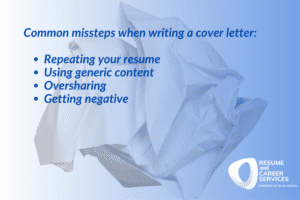The Benefits of a Great Cover Letter, aka Writing Your Way to a New Job

There’s a lot to think about as a job seeker. While many put all their faith and efforts into writing a stellar resume, they forget about the other components that are integral to a successful job search. Absolutely, a standout resume is crucial to landing interviews, especially in this competitive market when you’re battling the applicant tracking software systems so many employers are using. But could there also be power in using a great cover letter as part of your search?
Too many job seekers overlook the cover letter, a (some would say) equally vital companion to that all-important resume. Others, however, put too much weight on the cover letter, being meticulous about updating it every time yet not touching the resume. A great cover letter cannot make up for a mediocre resume, but when they are both stellar and used in concert, they can most certainly help you write your way to a new job faster than each may be able to do on its own.
Let’s delve into the significance of cover letters in your job search and provide you with some essential tips and examples to help you write a great cover letter that captivates prospective employers.
Why Cover Letters Still Matter
Before we dive in, there’s a burning question many job seekers have: “Do I even need a cover letter?” While the answer is not definitive, and it depends a bit on the position and what the employer has requested, the truth is that a cover letter always makes a better impression than a resume alone because it helps to introduce you and call out the experience, skills, and accomplishments you have that fit the job description’s requirements. Also, beyond the formality of a resume, a cover letter enables you to share your personality, enthusiasm, and motivation about the job and the company. Plus, it showcases your communication skills and attention to detail, both of which are desirable qualities for most jobs.
In short, cover letters do matter and can make a difference in your job search.
Key Components of a Great Cover Letter
Okay, now that you understand the benefit of using a cover letter, let’s discuss what’s involved. First off, keep it brief. Don’t expect that a great cover letter will mask the deficiencies in your resume; it is a supplement, not a substitute. The letter should be no longer than one page, and it should include the following:
-
A Strong Introduction
Gone are the days of “Dear Sir or Madam, please see my attached resume.” These days, you have to grab the reader’s attention quickly. Sure, mention what you’re applying for, but why not include something great about you, the company, or the industry? Even a fun fact can set the right tone depending on the culture of the company to which you’re applying.
-
Your Value Add
Just like your resume, a cover letter should be full of the value you can provide if the company chooses to add you to the team. Don’t be shy! Use the bulk of your cover letter to share your experiences and accomplishments that relate directly to the job requirements. It’s okay to repeat accomplishments from your resume too!
-
Some of Your Important Soft Skills
On a resume, soft skills are incorporated into the areas of expertise (aka skills, core competencies, or talent areas). Emphasize them in your cover letter as well because, in addition to your ability to fulfill the technical qualifications of the job, soft skills and transferable skills are a bonus for most candidates.
-
Your Personality and Enthusiasm for the Opportunity
While a resume is a formal document, a cover letter is a bit more personal—and personalized. Hiring managers and employers want to hear about your excitement about the company or the position, so let them know what interests and intrigues you. And if the company culture is a little fun, embrace that and be fun in your letter as well.
-
A Great Call to Action
Sometimes, job seekers start off a cover letter with positivity and enthusiasm, they match themselves to the position, and then…they fall off the ledge with a mushy close. Be sure to finish your letter with a strong call to action that thanks the reader for considering you and tells them that you’re eager for the next steps.
Tailor Your Cover Letter
Since we (and every other voice of authority) tell you again and again to customize your resume for every application, it stands to reason that we would repeat the same instructions when it comes to your cover letter. More than just updating the company name and job title, be sure your cover letter speaks to the specific talents the company seeks in filling this role. Each time you apply to a different position, invest 15 to 30 minutes to update your resume and cover letter.
These Shouldn’t Be on Your Great Cover Letter
Just as there are certain things you should include in your cover letter, there are certain aspects that shouldn’t be in it. Here are the common missteps job seekers often make when attempting to write a cover letter:
-
Repeating Your Resume
Ideally, your cover letter will complement your resume. It should not be the same. If you want to pull an accomplishment or two from your resume, that’s fine, but expand on them a bit to share how these past experiences will add value to this organization.
-
Using Generic Content
“Dear Sir or Madam” is not used on a cover letter anymore, and other overused statements should be avoided as well. Remember that you’re sharing your personality, not regurgitating something that recruiters and employers have heard on every other cover letter they’ve read.
-
Oversharing
We get it: You’re awesome. And you want to be sure a prospective employer can see that. But just as you shouldn’t go on and on about everything you’ve ever done on your resume, don’t do it on your cover letter either. No one needs to hear your life story, why you’re looking for a new job, or that you wrote a paper on spontaneous combustion when you were a junior in college. Stick to the point and be direct, concise, and focused.
-
Getting Negative
Even if you were fired from your last role or you’re trying to escape a toxic work environment, that’s not something you need to mention in your cover letter (or in the interview either). Stay positive in everything you share.
Hints for a Great Cover Letter at Every Stage
A great cover letter includes similar content regardless of where you are in your career journey. However, there are some special circumstances you can address in your letter to help write your way to a new job. Here are some examples.
-
New College Grad
Writing a resume as a new grad is hard, and it doesn’t get any easier when you shift to work on your cover letter. Focus on your enthusiasm for the company and eagerness to learn. Highlight relevant coursework, internships, and any transferable skills you’ve gained from extracurricular activities and jobs you’ve had while in school.
-
Career Transition
It may not be clear to a prospective employer how your experience as a graphic designer will benefit them if they hire you as their new IT technician, so tell them! Focus attention on the skills and experiences you’ve gained that differentiate you for this new role in a great way. And be sure to include any recent volunteer work, courses, or certifications you’ve completed that make you more valuable.
-
Following a Career Break
What if you’ve been out of work for a bit due to health issues, family changes, or raising children? You still have pertinent information to share in your resume and cover letter. Consider volunteer work that you engaged in during your break, consulting you provided, or even part-time projects.
-
Experienced Professional
With a depth of experience and an abundance of talents, writing a strong cover letter is often easier, but you may also tend to be too verbose. Streamline your letter by focusing specifically on what the company is looking for and has highlighted in the job description.
A Great Cover Letter Will Make a Difference in Your Efforts
Your well-crafted cover letter may just be the key to unlocking the door to your dream job. As you move forward in your job search, remember to incorporate a customized cover letter to complement your resume. One word of warning: Do not combine your cover letter with your resume onto one document. That will just confuse ATS systems, so keep them in their own files and upload the cover letter separately.
Need help with your career-marketing documents? Resume and Career Services has you covered. Our resume writers are skilled at crafting focused resumes and great cover letters that will help you achieve the results you seek. Learn more about options for working with us.
